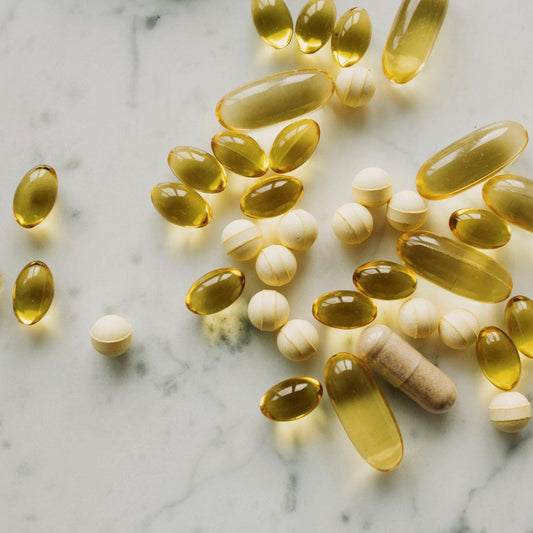
Omega 3 Fish Oil vs Flaxseed: What is the More Effective Form?
Omega 3 Fish Oil vs Flaxseed: What is the More Effective Form?
Omega 3 is among the most versatile, powerful natural supplements you have at your disposal - whether you’re trying to fight off inflammation or support eye health, improve fertility, encourage healthier hair and skin, or anything else.
However, there are many different ways you can get omega 3 into your daily regimen - with two of the most popular being omega 3 fish oil vs flaxseed oil. Are these two different ways to get the exact same results, or is one better than the other? We’re here to help you find out.
Learn about the differences in bioavailability, benefits, safety, cost, and more below, and see why our omega 3 fish oil 1000mg supplement is the #1 way to harness the power of omegas. It’s the most potent, pure source on the market and trusted by thousands of users worldwide.
What is Omega 3 in the First Place?
First things first, what is omega 3 and why do you need it in your dietary regimen? These are essential fatty acids your body can’t produce on its own - meaning you need to get them through diet or supplementation (better yet, a combination of both). Let’s look at the role they play below.
Health Benefits of Omega 3
So, what is the big deal about omega 3? These polyunsaturated fats are crucial components of cell membranes and play a vital role in numerous bodily functions, impacting heart health, brain function, inflammation, and a whole lot more.
Regular consumption can help lower levels of triglycerides, raise HDL (good) cholesterol, and reduce the likelihood of heart attacks and strokes. So, does omega 3 lower cholesterol? It sure does!
Beyond heart health, Omega 3s encourage better cognitive function. In fact, using omega 3 fish oil for brain fog is one of the best use cases for this supplement. These fatty acids are integral to brain development in infants and can enhance memory and performance in adults.
These fats also support a healthy inflammatory response, which can alleviate symptoms associated with chronic diseases like arthritis and contribute to smoother skin and healthier hair.
Types of Omega 3 Fatty Acids
It’s important to note that there are many different types of omega 3 fatty acids, but three are especially important:
- Eicosapentaenoic Acid (EPA): Predominantly found in marine oils. Especially beneficial for reducing cellular inflammation and is often used therapeutically for managing cardiovascular health.
- Docosahexaenoic Acid (DHA): Also mainly sourced from fish oil. Essential for brain development and health. It helps maintain normal brain function throughout life, particularly during the early developmental stages of life. This is why we recommend omega 3 fish oil for kids.
- Alpha-linolenic Acid (ALA): This plant-based Omega 3 is found in high concentrations in flaxseeds, chia seeds, and walnuts. It’s a precursor to EPA and DHA, which means that it needs to be converted by the body into these other forms to be used, although this process is typically inefficient.
Understanding these different types of Omega 3 fatty acids helps in choosing the right sources and supplements to meet dietary needs and health objectives. That being said, let’s get into some of the differences between omega 3 fish oil vs flaxseed omega 3s.
Overview of Omega 3 Fish Oil
You may be wondering, is fish oil the same as omega 3? Not at all - fish oil is just a source of omega 3s, just like cod liver oil, flaxseed oil, and many other sources. That being said, we do believe fish oil to be the best source of omega 3 fatty acids.
So, how is fish oil made? It’s derived from the tissue of oily fish such as salmon, mackerel, and sardines, which are rich in EPA and DHA. As we just mentioned, these support heart health, neurological development, and inflammatory responses throughout the body.
Omega 3 fish oil has been extensively researched and shown to provide a plethora of health benefits. Regular intake can help lower blood pressure, reduce triglyceride levels, slow the development of plaque in arteries, and decrease the likelihood of heart attack and stroke.
Additionally, DHA is essential for brain health and vision, making it a necessary component during pregnancy and early childhood for cognitive development. Now, let’s look at the other half of the flaxseed omega 3 vs fish oil comparison.
Overview of Flaxseed Omega 3
Flaxseed is a plant-based source of Omega 3 fatty acids, primarily in the form of ALA. Unlike the Omega 3 fatty acids found in fish oil (EPA and DHA), ALA must be converted by the body into these more active forms to be utilized effectively.
This conversion process is not very efficient in humans, with only a small percentage of ALA being converted into EPA and even less into DHA. This means you need to take a lot of flaxseed to get the benefits of omega 3.
Still, it’s a valuable source for those who are adhering to a strict vegan diet and refuse to consume any animal-based products. There are other benefits to flaxseed as well, notably its content of dietary fiber, lignans, and protein.
The health benefits of flaxseed Omega 3 include a better inflammatory response, enhanced cardiovascular health, and a potentially lowered risk of chronic diseases such as arthritis and heart disease. ALA has also been shown to help maintain normal blood cholesterol levels. The lignans in flaxseed provide antioxidant properties that can improve health further.
You’ll typically consume flaxseed as either ground seeds or through a flaxseed oil. It’s easy to incorporate into smoothies, salads, and baked goods. But, is omega 3 from flaxseed as good as from fish? Let’s compare and contrast omega 3 fish oil vs flaxseed below to help you find out.
Omega 3 Fish Oil vs Flaxseed: Is Omega-3 From Flaxseed as Good as From Fish?
While each of these sources of omega 3 has its place, the short answer is that no - flaxseed is not as good a source of omega 3 fatty acids as fish oil is. That’s not to say that flaxseed doesn’t have a place in your diet, but for the real benefits of omega 3, you need fish oil. Here’s why…
Bioavailability of Omega-3
Perhaps the most important consideration in comparing flaxseed omega 3 vs fish oil is bioavailability. So, how much omega 3 is in fish oil compared to flaxseed? Much more!
High bioavailability means the body can easily absorb and utilize these fatty acids without needing to convert them. In contrast, Omega-3 from flaxseed is mainly ALA (alpha-linolenic acid), which must be converted into EPA and DHA in the body.
This conversion process is inefficient, with only a small percentage of ALA being converted into the active forms. To get a bit more specific, only about 5-15% of ALA is converted to EPA and less than 5% is converted to DHA.
This means you need to consume a lot of flaxseed to get the same intake of omega 3 fatty acids compared to fish oil. It’s simply not sustainable on a day-to-day basis unless you’re willing to go out of your way to consume it.
Health Benefits
The specific omega 3 fish oil benefits vary slightly from those of flaxseed - although there is a little bit of crossover. Both of these offer benefits for heart health and inflammatory support.
That being said, there are far more powerful omega 3 fish oil benefits for skin and omega 3 fish oil benefits for hair. Similarly, using omega 3 fish oil for fertility, omega 3 fish oil for eyes, and omega 3 fish oil for inflammation will be much more efficient than flaxseed.
This is because fish oil naturally contains the more powerful and important omega 3 fatty acids, EPA and DHA. These are known to be effective in reducing arterial plaque, and decreasing the risk of arrhythmias.
Additional Nutritional Content
In looking at additional nutrition content provided by omega 3 fish oil vs flaxseed, you’ll see that flaxseed does have an edge here.
We referenced other compounds earlier such as fiber and lignans. These have antioxidant properties, making them a healthy part of a diet to improve bowel regularity and lower cholesterol. Flaxseed also has some protein content.
Fish oil does not provide these additional dietary benefits - it’s a more focused form of omega 3 fatty acids. This means if you choose fish oil over flaxseed you’ll need to fill in those dietary gaps some other way.
Risk of Contaminants
We recently talked about some of the omega 3 fish oil side effects, but the only real risk is that lower-quality fish oil supplements may contain mercury, PCBs, and dioxins, especially if sourced from larger predatory fish.
So, is fish oil safe during pregnancy or any other time for that matter? Absolutely - you just need to know how to tell if your fish oil is good quality!
Reputable suppliers often ensure purification processes to remove these contaminants. Third-party lab testing will provide you with peace of mind that you’re getting a safe, effective product. We’ll offer tips on choosing the right supplement later.
It is worth noting, though, that flaxseed typically has a lower risk of containing such environmental toxins but requires proper storage to prevent rancidity and preserve freshness.
Availability and Cost Considerations
In this day and age anyone can get their hands on either flaxseed omega 3 vs fish oil - but you’ll find that flaxseed is easier to find in grocery stores, whereas omega 3 fish oils are more commonly found online or in local supplement stores.
From a cost perspective, you will pay more upfront for fish oil omega 3s - but you’ll save money in the long run thanks to superior bioavailability. As we’ve said a few times throughout this guide you need to take a lot more flaxseed to get the same results.
So, Which is Better for Reaping the Benefits of Omega 3?
As you can see from this side-by-side comparison of omega 3 fish oil vs flaxseed, fish oil takes the cake in bioavailability and benefits. While it costs a bit more upfront it saves you money over time given its superior uptake.
In comparing other omega 3 sources, like cod liver vs fish oil, you’ll see a similar outcome. You simply cannot beat fish oil when it comes to omega 3 content and bioavailability. That being said, not all fish oil is created equal. So, what is the best omega-3 fish oil on the market? Look no further than Smarter Vitamins!
Harness the Power of the Most Potent, Pure Omega 3 Fish Oil Online at Smarter Vitamins!
Our Triple Strength Omega 3 Fish Oil is extracted from wild-caught Alaskan fish, known for their pure, uncontaminated environment. This means every dose is packed with the highest quality Omega-3 fatty acids. You get 1000mg of Omega-3 in every serving, expertly formulated to enhance cognitive function, support heart health, and improve overall well-being.
Our fish oil undergoes molecular distillation, a process that not only yields high-purity EPA and DHA but also minimizes any impurities, providing you with the safest and most effective product on the market.
Our commitment to sustainability is evident in our sourcing practices - every batch of AlaskOmega® fish oil is traceable back to the pristine, icy waters of Alaska, so you can rest assured you’re contributing to environmentally responsible consumption.
We prioritize non-GMO ingredients, adherence to Good Manufacturing Practices (cGMP), and rigorous third-party testing so you can shop with confidence today and join over 800,000 satisfied customers.
Our blog has additional resources, like when is the best time to take omega 3 fish oil or how long does it take for fish oil to work. At this point, though, it’s time we wrapped up our comparison of omega 3 fish oil vs flaxseed with a few parting thoughts.
Bringing Our Comparison of Flaxseed Omega 3 vs Fish Oil to a Close
There you have it - everything you need to know about the differences between omega 3 flaxseed vs fish oil omega 3s. While each has its place. Omega 3 has an edge in actually delivering benefits thanks to better bioavailability of the most important fatty acids - DHA and EPA.
We hope this comparison has left you with a clear understanding of which supplement is right for you. The only thing left to do now is experience the power of Smarter Vitamins high-quality omega 3 fish oil supplement. Invest in your health and wellbeing today!
Get exclusive access to sales, discounts, new product launches, awesome content & more.
Once a month or so.

































